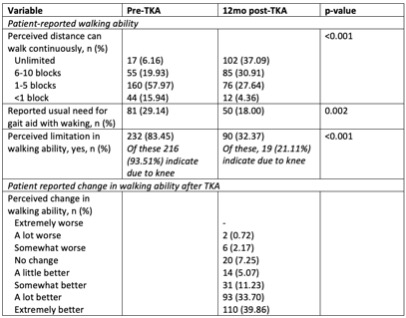Session Information
Session Type: Poster Session B
Session Time: 8:30AM-10:30AM
Background/Purpose: Improved ability to walk is a key driver for people with knee osteoarthritis (OA) to seek total knee arthroplasty (TKA). However, the extent to which patients’ expectations of walking improvement are met following TKA is unknown. In individuals with knee OA undergoing primary TKA, we assessed: 1) pre-TKA expectations about walking ability and gait aid use after TKA; 2) TKA patient-reported improvement in walking ability and gait aid use pre-TKA and 12 months post-TKA; and 3) whether gender differences were present.
Methods: Participants with knee OA completed standardized questionnaires 1 month prior to and 12 months after primary, elective TKA. Pre-TKA, we assessed sociodemographic and clinical characteristics and patients’ expectations for TKA (Hospital for Special Surgery Expectations Survey). Participants were asked to indicate how important “improved ability to walk” and “removed need for a gait aid” were to them as TKA outcomes (very important, yes/no). Both pre- and post-TKA, we assessed for perceived walking limitation (yes/no), gait aid use (yes/no) and walking ability (unlimited, 6-10 blocks, 1-5 blocks, < 1 block). At 12 months post-TKA, we assessed perceived change in walking ability (8-point Likert scale from “extremely worse” to “extremely better”). Values pre- and post-TKA were compared using McNemar tests. Chi-square tests compared gender differences in walking expectations pre-TKA and perceived walking ability at 12 months.
Results: 278 participants were included: mean age 67 years (SD 8.5), and 65.5% female. Pre-TKA, 97.5% indicated it was “very important” that TKA improve ability to walk and, of these, 98.1% desired to be able to walk medium-to-long distances. Of 68 (24.5%) who were using a gait aid pre-TKA, 84.0% indicated it was “very important” that TKA remove their need for one. At 12 months post-TKA, 73.6% reported walking “a lot” or “extremely better”. Overall, 68.0% reported they could walk 6 or more city blocks, 60.5% of gait aid users pre-TKA no longer required one, and 67.6% reported no walking limitation; of those who did, only 21.1% ascribed the walking limitation to their operated knee (Table 1). Pre-TKA, women and men had similar expectations of TKA to improve their ability to walk, but post-TKA, women were less likely to report being “unlimited” in walking ability compared to men (32.4% vs 46.2%, p< 0.03) and more likely to require a gait aid (21.4% vs 11.46%, p< 0.04).
Conclusion: This study confirmed the importance of improved ability to walk as a surgical outcome to patients undergoing TKA for knee OA, and elucidated that most expected TKA to enable walking medium to long distances. However, only two-thirds reported the ability to walk long distances post-TKA. A better understanding of causes of persistent walking limitation after TKA, as well as ways in which this can be addressed, are needed to support individuals with knee OA in meeting their walking expectations.
To cite this abstract in AMA style:
King L, Waugh E, Hawker G. Walking Ability 12 Months After Total Knee Arthroplasty for Osteoarthritis – Gap Between Expectations and Reality: The BEST Knee Cohort Study [abstract]. Arthritis Rheumatol. 2021; 73 (suppl 9). https://acrabstracts.org/abstract/walking-ability-12-months-after-total-knee-arthroplasty-for-osteoarthritis-gap-between-expectations-and-reality-the-best-knee-cohort-study/. Accessed .« Back to ACR Convergence 2021
ACR Meeting Abstracts - https://acrabstracts.org/abstract/walking-ability-12-months-after-total-knee-arthroplasty-for-osteoarthritis-gap-between-expectations-and-reality-the-best-knee-cohort-study/

